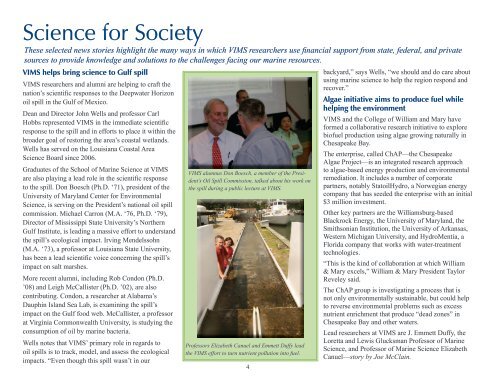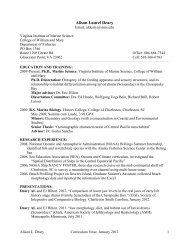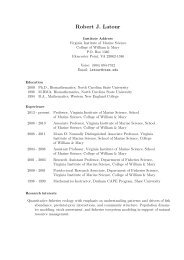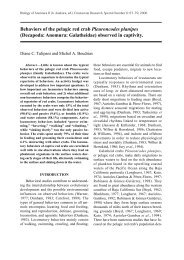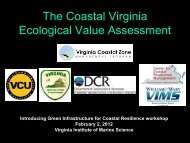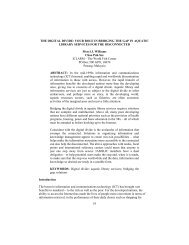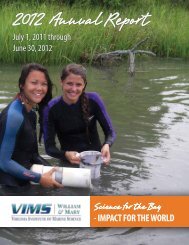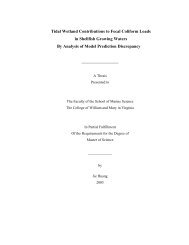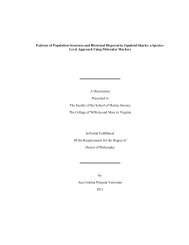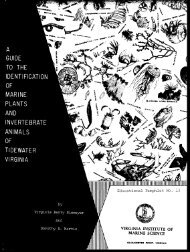2010 Annual Report - Virginia Institute of Marine Science
2010 Annual Report - Virginia Institute of Marine Science
2010 Annual Report - Virginia Institute of Marine Science
Create successful ePaper yourself
Turn your PDF publications into a flip-book with our unique Google optimized e-Paper software.
<strong>Science</strong> for Society<br />
These selected news stories highlight the many ways in which VIMS researchers use financial support from state, federal, and private<br />
sources to provide knowledge and solutions to the challenges facing our marine resources.<br />
VIMS helps bring science to Gulf spill<br />
VIMS researchers and alumni are helping to craft the<br />
nation’s scientific responses to the Deepwater Horizon<br />
oil spill in the Gulf <strong>of</strong> Mexico.<br />
Dean and Director John Wells and pr<strong>of</strong>essor Carl<br />
Hobbs represented VIMS in the immediate scientific<br />
response to the spill and in efforts to place it within the<br />
broader goal <strong>of</strong> restoring the area’s coastal wetlands.<br />
Wells has served on the Louisiana Coastal Area<br />
<strong>Science</strong> Board since 2006.<br />
Graduates <strong>of</strong> the School <strong>of</strong> <strong>Marine</strong> <strong>Science</strong> at VIMS<br />
are also playing a lead role in the scientific response<br />
to the spill. Don Boesch (Ph.D. ‘71), president <strong>of</strong> the<br />
University <strong>of</strong> Maryland Center for Environmental<br />
<strong>Science</strong>, is serving on the President’s national oil spill<br />
commission. Michael Carron (M.A. ‘76, Ph.D. ‘79),<br />
Director <strong>of</strong> Mississippi State University’s Northern<br />
Gulf <strong>Institute</strong>, is leading a massive effort to understand<br />
the spill’s ecological impact. Irving Mendelssohn<br />
(M.A. ‘73), a pr<strong>of</strong>essor at Louisiana State University,<br />
has been a lead scientific voice concerning the spill’s<br />
impact on salt marshes.<br />
More recent alumni, including Rob Condon (Ph.D.<br />
’08) and Leigh McCallister (Ph.D. ’02), are also<br />
contributing. Condon, a researcher at Alabama’s<br />
Dauphin Island Sea Lab, is examining the spill’s<br />
impact on the Gulf food web. McCallister, a pr<strong>of</strong>essor<br />
at <strong>Virginia</strong> Commonwealth University, is studying the<br />
consumption <strong>of</strong> oil by marine bacteria.<br />
Wells notes that VIMS’ primary role in regards to<br />
oil spills is to track, model, and assess the ecological<br />
impacts. “Even though this spill wasn’t in our<br />
VIMS alumnus Don Boesch, a member <strong>of</strong> the President’s<br />
Oil Spill Commission, talked about his work on<br />
the spill during a public lecture at VIMS.<br />
Pr<strong>of</strong>essors Elizabeth Canuel and Emmett Duffy lead<br />
the VIMS effort to turn nutrient pollution into fuel.<br />
4<br />
backyard,” says Wells, “we should and do care about<br />
using marine science to help the region respond and<br />
recover.”<br />
Algae initiative aims to produce fuel while<br />
helping the environment<br />
VIMS and the College <strong>of</strong> William and Mary have<br />
formed a collaborative research initiative to explore<br />
bi<strong>of</strong>uel production using algae growing naturally in<br />
Chesapeake Bay.<br />
The enterprise, called ChAP—the Chesapeake<br />
Algae Project—is an integrated research approach<br />
to algae-based energy production and environmental<br />
remediation. It includes a number <strong>of</strong> corporate<br />
partners, notably StatoilHydro, a Norwegian energy<br />
company that has seeded the enterprise with an initial<br />
$3 million investment.<br />
Other key partners are the Williamsburg-based<br />
Blackrock Energy, the University <strong>of</strong> Maryland, the<br />
Smithsonian Institution, the University <strong>of</strong> Arkansas,<br />
Western Michigan University, and HydroMentia, a<br />
Florida company that works with water-treatment<br />
technologies.<br />
“This is the kind <strong>of</strong> collaboration at which William<br />
& Mary excels,” William & Mary President Taylor<br />
Reveley said.<br />
The ChAP group is investigating a process that is<br />
not only environmentally sustainable, but could help<br />
to reverse environmental problems such as excess<br />
nutrient enrichment that produce “dead zones” in<br />
Chesapeake Bay and other waters.<br />
Lead researchers at VIMS are J. Emmett Duffy, the<br />
Loretta and Lewis Glucksman Pr<strong>of</strong>essor <strong>of</strong> <strong>Marine</strong><br />
<strong>Science</strong>, and Pr<strong>of</strong>essor <strong>of</strong> <strong>Marine</strong> <strong>Science</strong> Elizabeth<br />
Canuel—story by Joe McClain.


